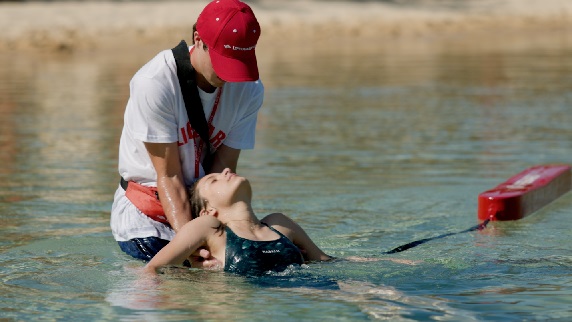Winter lifeguarding presents unique challenges and misconceptions. As the temperatures drop, so do the number of beachgoers. However, the need for vigilant lifeguards remains crucial.
Myth: No Lifeguarding Needed
A prevailing myth is that cold weather means no need for lifeguards. Contrary to popular belief, water-related accidents can occur in any season. Icy waters pose significant risks, from hypothermia to unexpected strong currents.
Theory: Cold Water Risks
Cold water shock can paralyze even the strongest swimmers. It triggers an involuntary gasp and hyperventilation, leading to potential drowning. Lifeguards in winter must be alert to these sudden dangers.
Myth: Reduced Visibility
Many assume that in winter, lifeguards struggle with reduced visibility. Contrarily, the absence of intense sunlight might improve a lifeguard’s ability to spot distressed swimmers due to reduced glare.
Theory: Clothing as a Challenge
Winter clothing can be misleading. Layers can hinder a swimmer’s movements and increase fatigue. Lifeguards must be cautious, as a seemingly struggling swimmer might just be weighed down by heavy winter attire.
Myth: Empty Beaches
The notion that beaches are vacant in winter diminishes the importance of lifeguards. While crowds thin, dedicated swimmers, surfers, and even casual beachgoers still frequent the shores.
Theory: Isolation Risks
Fewer people mean potentially slower rescue response times. Winter lifeguards must contend with the isolation factor, emphasizing the need for quick and efficient actions in emergencies.
Myth: Inactive Lifeguard Duties
Belief that winter lifeguarding is passive and dull overlooks the continuous need for surveillance and readiness. Though less crowded, the risks remain, demanding constant vigilance.
Theory: Constant Preparedness
Lifeguards in winter should be even more prepared due to fewer resources and potential delays in assistance. Every moment demands readiness for swift and effective action.
Myth: Lack of Training Opportunities
The assumption that winter limits lifeguard training is erroneous. Indoor pools and simulated winter conditions offer excellent training scenarios for aspiring and current lifeguards.
Theory: Training Adaptations
Winter conditions prompt adaptive training methodologies, including scenarios for cold water rescues and simulated heavy winter clothing for realistic practice sessions.
Myth: Lifeguarding Seasonality
The belief that lifeguarding is strictly a summer profession disregards the year-round demand for certified and skilled professionals.
Theory: Year-Round Need
Accidents in or around water can happen at any time, making the availability of certified lifeguards a necessity irrespective of the season.
Myth: Limited Certification Opportunities
The misconception that obtaining lifeguard certification is scarce in winter neglects the numerous accredited institutions providing lifeguard classes year-round.
Theory: Persistent Availability
American Lifeguard Association (ALA) and similar accredited bodies offer lifeguard training consistently, ensuring the availability of lifeguard classes even in winter.
Myth: Exclusion of Specialized Skills
There’s a misconception that winter lifeguarding doesn’t require specialized skills. In reality, cold-water rescue techniques and understanding the effects of hypothermia on drowning victims are crucial. Lifeguards must possess specialized knowledge to address these unique challenges effectively.
Theory: Specialized Winter Training
Winter lifeguarding demands specific skills, such as understanding the signs of cold-related illnesses and employing specialized equipment suited for icy conditions. Training in these areas ensures lifeguards are well-equipped to handle the distinct challenges of the colder months.
Myth: Irrelevance of Public Education
Some believe that educating the public about water safety in winter is unnecessary due to reduced beach attendance. However, promoting awareness of cold water risks and the importance of cautious swimming during colder seasons is imperative to prevent accidents.
Theory: Educating for Safety
Public education on winter water safety remains crucial. Teaching the community about the dangers of cold water, the significance of supervised swimming, and the necessity of adhering to lifeguard instructions can significantly reduce the risks associated with winter water activities.
Myth: Limited Lifeguarding Career Prospects
There’s a myth that winter lifeguarding offers limited career prospects compared to summer roles. However, experience gained during winter months enhances a lifeguard’s skill set, potentially opening doors to year-round or specialized positions in the field.
Theory: Expanded Skill Portfolio
Winter lifeguarding augments a lifeguard’s capabilities, showcasing adaptability and proficiency in handling diverse conditions. This experience can be invaluable for career advancement, offering opportunities in various water safety and emergency response roles.
Final Word
Winter lifeguarding challenges popular myths that diminish its significance. Specialized skills, ongoing education, and an expanded career scope make it an essential and dynamic field. The American Lifeguard Association, through its consistent training opportunities, ensures a continuous supply of well-prepared lifeguards equipped to navigate the distinct demands of winter water safety.
Also Read About- E Uparjan- Online Kharif Procurement Monitoring System(2023-24)
